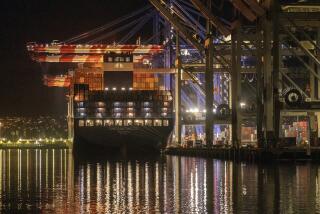We’re Adrift in the South Pacific : Years of Neglect Have Put U.S. Interests at Risk
- Share via
Few place names are more magical than the words South Pacific. They conjure images of coral sands and coconut palms, of grass skirts and crystal lagoons, of “Treasure Island,” Michener and Gauguin. This South Pacific maintains its fascination for tourists, but it has had little relevance to the arena of public policy.
Four decades ago Americans fought a succession of bloody battles from the jungles of New Guinea to the atolls of Micronesia against entrenched Japanese forces. The United States emerged from the conflict as the administrator of far-flung trust territories including the Marianas, the Carolines and the Marshalls, in addition to such pre-war possessions as American Samoa, Wake and Guam.
In the years since the war, strategic weapons designers were the only segment of the government to give the region much thought. The atolls of Bikini and Eniwetok were sites of U.S. thermonuclear tests in the 1950s, and more recently Kwajalein atoll has been the downrange terminus for ICBM tests launched from California.
If not an American lake, the postwar South Pacific was certainly friendly territory. The process of decolonization came relatively late and painlessly to the region. The result was a scattering of pro-Western mini-states, several of them closely associated with Australia and New Zealand. The U.S. 7th Fleet roamed the seas unchallenged. The Communist Bloc was notable by its absence, making the South Pacific easily the most extensive region on the planet with no significant communist presence. The ANZUS alliance of Australia, New Zealand and the United States provided an indirect security guarantee to the largely defenseless new countries.
The pro-Western orientation of the region has been reinforced by the strong influence of Christian churches, both Protestant and Catholic, and the almost sacred memory of the American GI. For many of the indigenous peoples, the GIs were the first “Europeans” to treat them as equals.
In the last few years we have begun to squander the influence and good will that we purchased at such cost during the war. Some change was inevitable with the aging of the wartime generation, decolonization, shifting priorities of U.S. policy, and the emergence of the Soviet Union as a naval power. Nevertheless, many of our recent wounds are self-inflicted.
The only commercially significant economic resource that many of these small countries have is fish--specifically the tuna that migrate through their offshore waters. Since 1980 American tuna fishermen have worked these waters, refusing to recognize the jurisdiction of the South Pacific states over their self-declared economic zones. Like latter-day buccaneers, secure in the knowledge that their boats are bigger and faster than anything local governments can muster, American tuna fishermen have defied local laws and licensing requirements. The result has been a predictable harvest of anti-American anger and frustration.
In 1983 Washington proposed to solve the problem by negotiating a multilateral agreement with South Pacific countries whereby they would grant licenses to American tuna fishermen in return for an annual payment combining contributions from the U.S. government and the tuna industry. Negotiations dragged on over relatively small amounts of money. Finally, last month a five-year agreement was signed, under which the government and the industry will provide $12 million annually, to be divided among 16 countries.
Not surprisingly, anti-nuclear sentiment is strong in the South Pacific. The region has been a testing ground for nuclear weapons--first by the United States, now by France. This has given rise to insistent local demands for a treaty proclaiming the area a nuclear-free zone. New Zealand’s decision to ban port calls by nuclear-capable U.S. ships has given this movement further impetus.
Anxious to preserve American strategic capabilities in the Pacific, Australia has worked hard to shape a treaty that would meet U.S. requirements to protect freedom of U.S. naval transit through the zone and maintain the right of each South Pacific state to make its own policy on the question of port access.
Since only two of the 13 potential signatory countries in the South Pacific have adopted policies similar to New Zealand’s on on ship visits, the remainder will continue to permit visits by U.S. nuclear-capable vessels. Thus, support for the treaty is fully consistent with the strong stand that the United States has taken in its relations with New Zealand on this issue.
Nevertheless, Washington now is equivocating on the question of signing the protocols. Meanwhile, China and the Soviet Union have stated they will sign. Consequently, what began as an initiative to protect U.S. interests is in danger of being captured by the communist countries.
Against this backdrop of American foot-dragging and shortsightedness, the Soviet Union has begun to make inroads into the region. The Pacific fleet has become the Soviet navy’s largest, complete with a warm-water port at Cam Ranh Bay; Soviet fishing agreements are being negotiated with two South Pacific governments, and Mikhail S. Gorbachev has laid public claim to a Soviet role as a great power in the Pacific.
It is time we woke up. We must stop losing the game in the South Pacific by default. We don’t need more ships or huge new expenditures on foreign aid. We do need to show a little sensitivity to the concerns of the small states of the region. The tuna agreement is an important first step and I applaud it. Next we should announce our intent to accede to the South Pacific nuclear-free-zone protocols. In no other place on Earth is so much to be won for so little.
More to Read
Sign up for Essential California
The most important California stories and recommendations in your inbox every morning.
You may occasionally receive promotional content from the Los Angeles Times.










